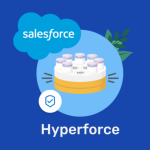In the digital age, the fusion of mobile technology with powerful CRM tools like Salesforce has revolutionised how businesses interact with their customers. Salesforce app development allows companies to create custom applications that not only enhance customer engagement but also streamline business processes and improve data management. Here, we explore effective strategies for crafting a mobile application using Salesforce platforms, ensuring your business leverages the full potential of custom app development.
The mobile revolution, a pivotal moment in technology, began less than a decade ago with the debut of the first HTML-capable mobile device, opening up endless possibilities for connectivity. This innovation made the vast resources of the internet accessible anytime, anywhere, igniting a surge in demand for smart devices. By the end of 2017, the global penetration of smartphones hit 44%, and projections suggest around 6 billion smart devices worldwide by 2020. Yet, the true essence of this revolution lies not in the hardware but in the software. Apps breathe life into smartphones and tablets, transforming them from mere gadgets into powerful tools capable of executing complex operations.
Understanding Salesforce Platforms
Salesforce offers a robust ecosystem for developing mobile applications. Key platforms include Salesforce Mobile SDK, Heroku, and Salesforce Lightning Platform. Each platform has unique features tailored for different development needs, from integrating Salesforce data into mobile apps to building completely customised applications.
Salesforce Mobile SDK
The Salesforce Mobile SDK provides tools and resources to develop native, hybrid, and web mobile applications connected to Salesforce data. It’s ideal for creating apps that require direct access to Salesforce from mobile devices, offering both flexibility and power in app development.
Heroku
Heroku supports the development of apps using languages like Ruby, Java, PHP, and more. It’s a cloud platform service that allows developers to build, run, and operate applications entirely in the cloud, facilitating the creation of scalable and flexible apps.
Salesforce Lightning Platform
The Salesforce Lightning Platform (formerly Salesforce1 Platform) enables rapid development of apps with a drag-and-drop interface. It’s particularly suited for non-developers looking to create custom applications quickly without extensive coding knowledge.
Planning Your Mobile App Development
When planning your mobile app development on Salesforce platforms, begin by articulating your app’s objectives and identifying the Salesforce features it will utilise. Conduct thorough research to understand your target users’ needs and preferences. This foundation ensures your app is purpose-built to enhance user engagement and streamline business processes effectively.
Defining Your App’s Objectives
Start by defining clear objectives for your mobile app. Consider what business processes it aims to improve, how it will enhance customer engagement, and the specific Salesforce data it will utilise. Clear objectives guide the development process and help ensure the app meets its intended goals.
Assessing User Needs and Expectations
Understanding the needs and expectations of your app’s users is crucial. Conduct surveys, interviews, and research to gather insights into user preferences, pain points, and desired features. This information will shape your app’s design and functionality, ensuring it provides value to its users.
Designing and Developing Your Mobile App
In designing and developing your mobile app, prioritise user experience (UX) by creating an intuitive, attractive interface and seamless navigation. Leverage Salesforce platforms for backend integration, ensuring robust data handling and personalization capabilities. Adopt agile development methodologies, enabling iterative releases and continuous improvements based on user feedback and testing results.
Emphasising User Experience (UX)
The success of your mobile app heavily depends on its user experience. Design your app with intuitive navigation, fast loading times, and a clean interface. Consider the Salesforce Mobile Design Guidelines to ensure your app is not only functional but also visually appealing and user-friendly.
Leveraging Salesforce Data
Make the most of Salesforce’s data capabilities. Use the Salesforce API to integrate customer data, sales information, and other relevant data into your app. This integration allows for personalised user experiences and more efficient data management.
Testing and Deployment
Thorough testing is crucial before deployment, including functional, performance, and user acceptance tests, to ensure your app meets quality standards and user expectations. Develop a strategic deployment plan, focusing on a smooth rollout, user training, and support mechanisms. Post-launch, continuously monitor app performance and user feedback for iterative enhancements.
Rigorous Testing
Before launching your app, conduct thorough testing to identify and fix any bugs or usability issues. Include unit testing, integration testing, and user acceptance testing (UAT) to ensure your app is reliable, secure, and meets user expectations.
Deployment Strategy
Develop a clear deployment strategy. Consider how you will roll out the app to users, manage updates, and gather feedback for future improvements. Ensure your strategy includes measures for monitoring app performance and user engagement post-launch.
Conclusion
Crafting a mobile application using Salesforce platforms offers a pathway to enhancing customer engagement and streamlining business operations. By understanding the Salesforce ecosystem, planning effectively, focusing on user experience, and conducting thorough testing and deployment, businesses can successfully leverage Salesforce for mobile app development.
FAQs
Q: Can I develop a mobile app with Salesforce without coding skills?
A: Yes, platforms like the Salesforce Lightning Platform allow for app development with minimal coding through drag-and-drop interfaces.
Q: How does Salesforce integration benefit my mobile app?
A: Integrating Salesforce with your mobile app allows for real-time data access, personalised user experiences, and streamlined business processes.
Q: What is the difference between native and hybrid Salesforce mobile apps?
A: Native apps are developed for specific platforms using platform-specific programming languages, offering high performance and full device integration. Hybrid apps are web apps wrapped in a native container, running on multiple platforms but with some limitations in performance and integration.
How TTC Groups Can Help with Crafting a Mobile Application Using Salesforce Platforms
Embarking on Salesforce app development can be a complex journey requiring specific expertise and strategic planning. TTC Group offers comprehensive support to businesses looking to craft mobile applications using Salesforce platforms. Our team of experts specialises in Salesforce custom app development, providing guidance from initial planning and design to development, testing, and deployment. With our deep understanding of the Salesforce ecosystem and commitment to quality, Tech Talent Consulting is your ideal partner for creating impactful mobile applications that drive business success.









